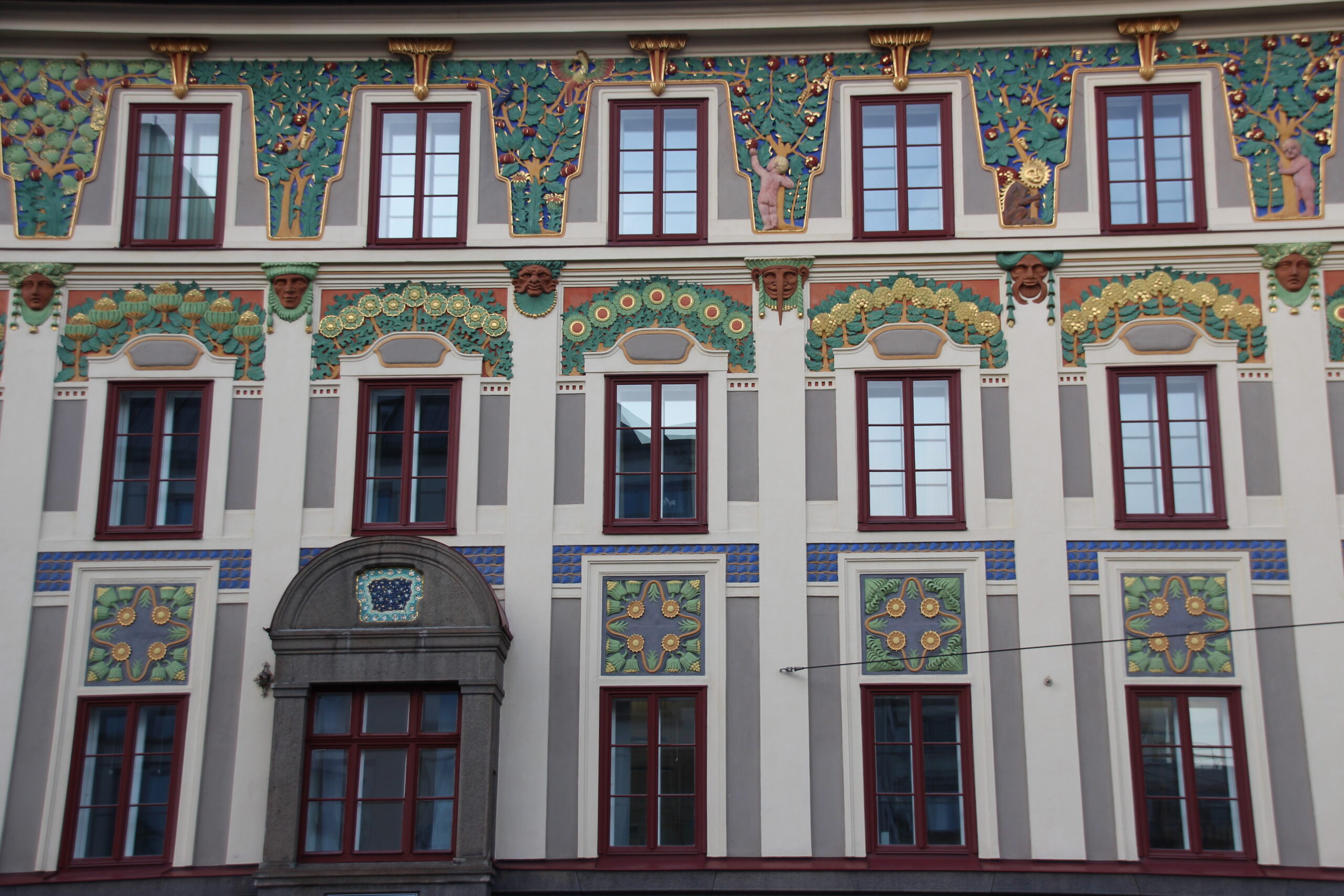Life reform and social democracy
Life reform and social democracy
"Light air and sun" was the motto of the Lebensreform, a collective movement of alternative lifestyles that began in Germany in the late 19th century in step with the development of social democracy and the rise of the bourgeoisie. People wanted to distance themselves from what Max Weber described as the Protestant ethic, industry, time clocks and, in general, rapid technological progress with all its effects on people and the social fabric. The culture of the old society, in which the nobility and clergy stood above the rest of society, was to be overcome.
The Lebensreform influenced art and architecture in particular. Urbanisation and the associated living conditions were increasingly perceived as a burden. Art Nouveau in its playfulness was the artistic response of the bourgeois elites and creative minds to this Back to the origin of the turn of the century, was hardly able to assert itself in Innsbruck. People as individuals, not their economic performance, should once again take centre stage. This attitude gave rise to vegetarianism, nudism, garden cities, various esoteric movements and other alternative lifestyles, which have survived in one form or another to this day.
What was possible for wealthy citizens in their villas in Saggen, Wilten and Pradl was denied to most workers. Many tenement blocks were dreary and overcrowded biotopes without infrastructure such as sports facilities or parks. Modern housing estates should be functional, comfortable, affordable and connected with green spaces. These views also prevailed in public authorities. Albert Gruber, professor at the Innsbruck Trade School, wrote in 1907:
"I've often heard people say that we don't need plants in Innsbruck, that nature provides us with everything, but that's not true. What could be nicer than when professionals can walk from their place of work to their home through a series of plants. It turns the journey to and from work into a relaxing walk. Incidentally, there are many reasons why planting trees and gardens in urban areas is beneficial. I do not want to emphasise the interaction between people and plants, which is probably well known. In another way, plants improve the air we breathe by reducing dust."
In many cases, however, the fulfilment of this demand had to wait until after the First World War. The major infrastructure and housing projects in Innsbruck, such as the Tivoli, the municipal indoor swimming pool, the Pembaur, Mandelsberger and Schlachthof blocks, were not realised until the First Republic. Although social democracy had officially existed as a political movement since 1889, it only had very limited creative possibilities under the Habsburg monarchy. This was doubly true for the conservative Catholic Tyrol.
Josef Prachensky (1861 - 1931), the father of architect and town planner Theodor Prachensky, was a well-known Innsbruck representative of the Lebensreform and social democracy. He grew up in German-speaking Bohemia, then part of the Austro-Hungarian Empire. As a trained book printer, he discovered the labour movement during his wanderings in Vienna during the book printers' strike. After marrying a Tyrolean woman, he settled in Innsbruck, where he worked as an editor for the Social Democratic People's newspaper for Tyrol and Vorarlberg worked. Josef Prachensky supported the Arbeiter-Consum-Vereinwhich Tyrolean labourers' bakery and founded the catering business "Non-alcoholic", which aimed to improve general health in the spirit of the life reform movement and socialism. Friedrich Engels (1820 - 1895), the co-author of the Communist Manifestohad recognised schnapps and brandy as an evil of the working class in the first half of the 19th century. Socialism shared the goal of getting people away from alcohol with church organisations, like so many other things. The communist revolution was no more feasible with addicts than a virtuous, God-pleasing life.
Prachensky was involved in the founding of the Tyrolean Social Democratic Party in 1890 and, after the First World War, in the founding of the Tyrolean Republican Defence League the left-wing counterpart to the right-wing Heimwehr organisations. One of his particular concerns was the restriction of the church on school education, which was still very high in the 19th and early 20th century, even in the actually liberal Innsbruck, which had to adhere to the national school regulations.
Sights to see...
Tivoli
Sillufer / Pradl
Städtisches Hallenbad
Amraserstraße 3
Pembaurblock
Pembaurstraße 31 – 41
Winklerhaus
Leopoldstraße/Maximilianstraße
